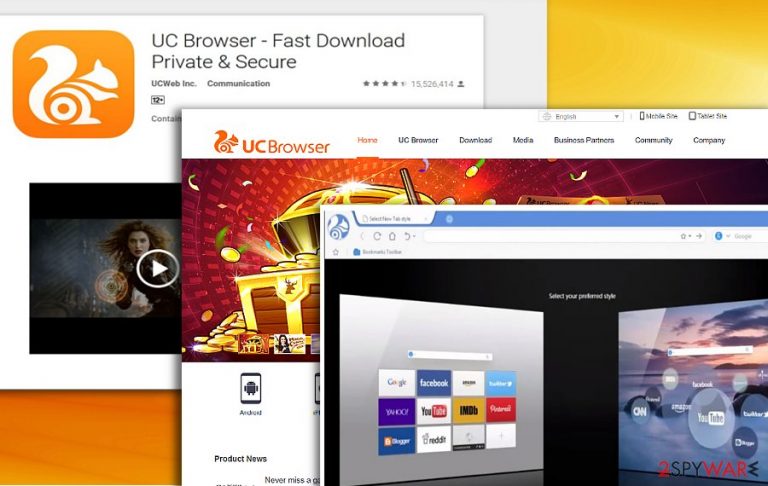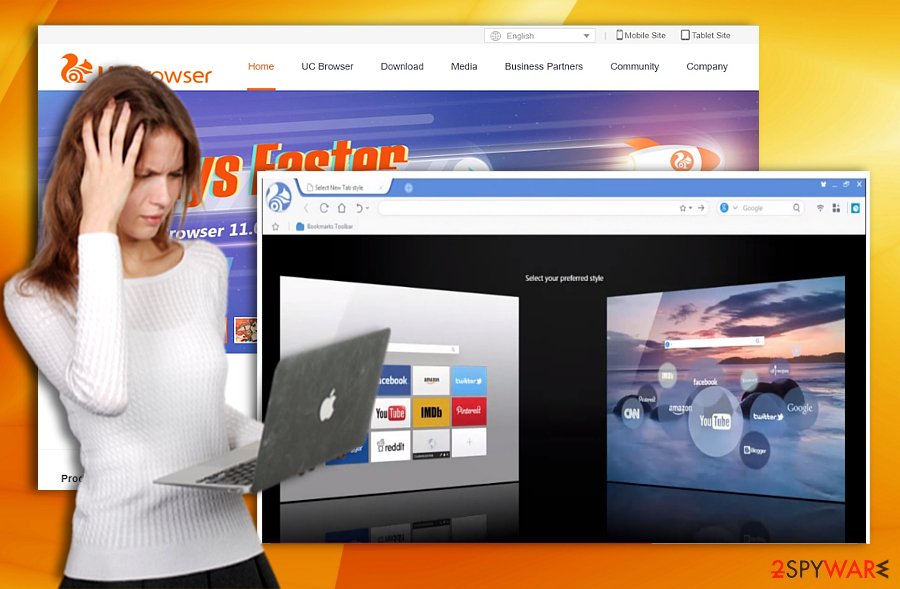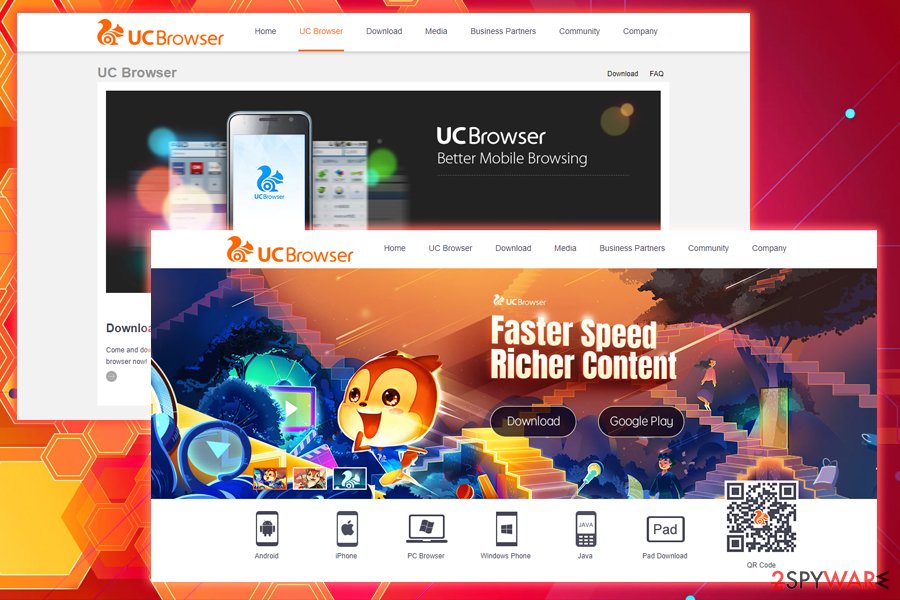How to uninstall UC Browser
UC Browser virus Removal Guide
What is UC Browser virus?
UC browser is a legitimate web browser but might pose serious privacy issues

UC Browser is an alternative web browser created by a Chinese[1] mobile Internet company UCWeb which also belongs to Alibaba Group of China[2]. Also, it can be downloaded from multiple official sources, such as Google Play or Microsoft Store. Additionally, UC Browser is widely used in Asia and is the third most-used mobile web browser. Nevertheless, some users and security expressed concerns about the privacy issues that are related to the app, as it uses weak encryption to store data and also might be transferring personal information to third-parties. What is more, according to Snowden-leaked documents, the app was involved in cyber espionage conducted by the Five Eyes intelligence community.[3]
| Name | UC Browser |
| Type | Web browsing application |
| Risks involved | Leaks sensitive IMSI, IMEI, MSISDN data, Android ID, MAC address and other data; delivers the information to third-parties |
| Distribution | Google Play, Microsoft Store, App Store, software bundling |
| Compatible platforms | Android, iOS, Windows, Windows Phone |
| Elimination | Uninstall using our instructions below, and scan your device with security software |
| Optimization | We recommend scanning your device with FortectIntego to make sure all the malicious components of unwanted software are eliminated |
The company has created multiple browser versions. It is compatible with a standalone PC user. You can also find UC Mini designed for Android phones. The search tool is promoted as the engine which meets even the pickiest users’ demands: fast and secure and an ad-free experience. The search tool operates in Chrome, Internet Explorer, and Opera browser.
However, there have been multiple complaints about this browser which led users call this browser a Chinese UC Browser virus. Let us look through the cases thoroughly and discuss ways how to remove UC browser virus.
The browser was launched in April 2004. However, though quite a while has passed, complaints have not ceased. In 2016, the very browser was flagged as a trojan.Agent.lwrp[4]. Security specialists have considered it as a false positive.
Additionally, a thorough analysis by Citizen Lab disclosed that the browser is not save and uses weak encryption:[5]
Our analysis finds that all versions of the browser examined, both Windows and Android, transmit personal user data with easily decryptable encryption. In addition, the Windows version of the application does not properly secure its software update process, leaving it vulnerable to arbitrary code execution.
Furthermore, the Ministry of Electronics and Information Technology (MEITY) in India was investigating the breach that allegedly sent private information of Indian users to Chinese servers, as well as left devices with altered DNS settings after UC Browser removal.

Promoted in the phishing site
Now, neither UC browser official site nor the installer is labeled as malicious[6]. Nonetheless, reports about this browser being a virus are still quite new. Bothersome ads have been redirecting users to the phishing site http://rewardcenter-today.pw which attempts to deceive users that their device is infected with malware.
This scam was mainly spotted in Opera Mini browser designed for mobile devices. The message says that “your Opera Mini is heavily damaged by (5) viruses.” The message urges victims to switch to UC Browser to prevent further damage on the SIM card[7]. However, such reports are simply scareware.
In response to these claims, the representative of International UC Browser company stated dishonest marketing publishers were at fault for using such techniques to direct traffic to UCWeb products. He also added that the company will tackle the issue.
On the other hand, such statement does not provide necessary answers to the questions. What is be the point of directing the traffic to UC Browsers without gaining profit? It is very unlikely that the marketers receive the profit from other than the main distributor.
Dubious privacy policy provisions
The very privacy policy of UC browser only fortifies the assumptions about dubious promotion techniques. It mentions that no private data is shared without users’ consent. On the other hand, they mention that:
We may share your personal information, which may include your name and contact information (including email address) with third parties that perform certain services on our behalf. These services may include providing support, performing data analysis, and providing and supporting Site functionality and features.
Though the UC browser developers claim that these providers are obliged not to use the acquired information other than for service providing purposes, the above-discussed sample of the phishing site suggests that the developers failed at surveying them properly.
Further paragraphs mention that the collected non-personal information which includes browsing history, search entries, IP address and other related data, might be shared with the service providers. As a result, more personalized ads might distract you during browsing sessions and if such phenomenon bothers you, you might start thinking how to remove Chinese UC browser. 
Trouble eliminating the browser
Up until now, there have been multiple reports about difficulties eliminating the browsers. Users complained that “Add/Remove a program” function does not work. In other cases, uninstalling the program via the Control panel does not help eradicate the program.
Users find it difficult how to remove uc.exe virus by eradicating uefochubsrv.sys file[8].Users report that while using UC Browser, search function ceases functioning. Others get irritated by the fact that they cannot revert to the browser easily.
Mobile users might find it even more aggravating looking for ways how to how to remove UC browser from a phone. On the other hand, there is no need to worry. More information is provided below. Speaking of standalone PC users, we recommend downloading and installing security software that can eliminate computer viruses. After full UC browser removal, make use of FortectIntego to make sure all the unwanted components are eliminated.
Ways to detect PUP on time
The distribution network is another aspect which sparks doubts about UC browser. It has been spotted promoted along with other tools and often quite dubious program. In order to avoid the so-called UC browser hijack, carefully inspect the installation wizards.
Before clicking the “Install” button, opt for “Custom” settings. They will disclose unnecessary optional tools, and you will be able to deselect them. If you are sure that no unnecessary add-ons will be installed along, proceed further. Now let us review methods how to remove UC browser virus Windows 10 and phone versions.
Eliminate the browser and its components
In order to delete the program, you may use the Uninstall setup file found in the UC browser. Click on the Start button, find or type UC browser. Right-click on it and choose Open file location. Once the folder opens, click on the Uninstall file. Follow further UC Browser removal instructions.
If that does help, launch Registry Editor.
- Press Windows key+R and type regedit. Click Enter and then Registry Editor opens.
- Click on Edit, then choose Find Next.
- Type UC Browser and click enter.
- If it finds uefochubsrv.sys or any other file associated with the browser, right-click on them and delete.
If you are wondering how to remove UC virus faster, let malware elimination program take care of the malware. Update it and run the scan. If you are struggling with the virus on Android, install the mobile anti-virus version and scan the device.
If that does not help, you might opt for the last solution – factory data reset. Note that this action wipes all existing data on the device. You can find this option on Settings and then Backup&Reset. After you tap factory data reset, choose Erase everything.
You may remove virus damage with a help of FortectIntego. SpyHunter 5Combo Cleaner and Malwarebytes are recommended to detect potentially unwanted programs and viruses with all their files and registry entries that are related to them.
Getting rid of UC Browser virus. Follow these steps
Uninstall from Windows
Uninstall UC Browser via Control Panel as explained below:
Instructions for Windows 10/8 machines:
- Enter Control Panel into Windows search box and hit Enter or click on the search result.
- Under Programs, select Uninstall a program.

- From the list, find the entry of the suspicious program.
- Right-click on the application and select Uninstall.
- If User Account Control shows up, click Yes.
- Wait till uninstallation process is complete and click OK.

If you are Windows 7/XP user, proceed with the following instructions:
- Click on Windows Start > Control Panel located on the right pane (if you are Windows XP user, click on Add/Remove Programs).
- In Control Panel, select Programs > Uninstall a program.

- Pick the unwanted application by clicking on it once.
- At the top, click Uninstall/Change.
- In the confirmation prompt, pick Yes.
- Click OK once the removal process is finished.
After uninstalling this potentially unwanted program (PUP) and fixing each of your web browsers, we recommend you to scan your PC system with a reputable anti-spyware. This will help you to get rid of UC Browser registry traces and will also identify related parasites or possible malware infections on your computer. For that you can use our top-rated malware remover: FortectIntego, SpyHunter 5Combo Cleaner or Malwarebytes.
How to prevent from getting system tools
Protect your privacy – employ a VPN
There are several ways how to make your online time more private – you can access an incognito tab. However, there is no secret that even in this mode, you are tracked for advertising purposes. There is a way to add an extra layer of protection and create a completely anonymous web browsing practice with the help of Private Internet Access VPN. This software reroutes traffic through different servers, thus leaving your IP address and geolocation in disguise. Besides, it is based on a strict no-log policy, meaning that no data will be recorded, leaked, and available for both first and third parties. The combination of a secure web browser and Private Internet Access VPN will let you browse the Internet without a feeling of being spied or targeted by criminals.
No backups? No problem. Use a data recovery tool
If you wonder how data loss can occur, you should not look any further for answers – human errors, malware attacks, hardware failures, power cuts, natural disasters, or even simple negligence. In some cases, lost files are extremely important, and many straight out panic when such an unfortunate course of events happen. Due to this, you should always ensure that you prepare proper data backups on a regular basis.
If you were caught by surprise and did not have any backups to restore your files from, not everything is lost. Data Recovery Pro is one of the leading file recovery solutions you can find on the market – it is likely to restore even lost emails or data located on an external device.
- ^ Get rid of computer threats. Wubingdu. Security and spyware news in Chinese.
- ^ UC Browser. Wikipedia. The free encyclopedia.
- ^ Spy agencies target mobile phones, app stores to implant spyware. CBC. Canada's Public Broadcaster.
- ^ Borisgong. UC Browser detected as Trojan. Malwarebytes Forums.
- ^ Jeffrey Knockel, Adam Senft, and Ron Deibert. A Further Look at Privacy and Security Issues in UC Browser. The Citizen Lab. Interdisciplinary laboratory.
- ^ uefochubsrv.sys . VirusTotal. Free malevolent URL and file analysis service.
- ^ Malicious and unsecure ads linking to UC Browser downloads. Opera Blogs.
- ^ User1983. UCBrowser and uefochubsrv suddenly appeared on my PC. BleepingComputer. News,reviews, forums, and tech support.
